Related Research Articles
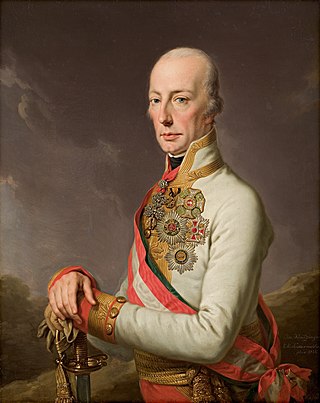
Francis II and I was the last Holy Roman Emperor as Francis II from 1792 to 1806, and the first Emperor of Austria as Francis I from 1804 to 1835. He was also King of Hungary, Croatia and Bohemia, and served as the first president of the German Confederation following its establishment in 1815.
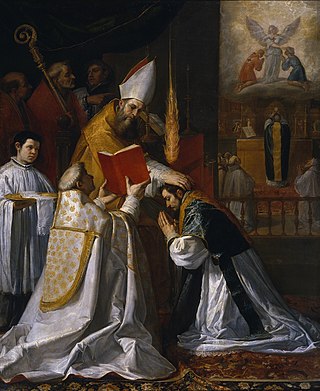
In certain Christian denominations, holy orders are the ordained ministries of bishop, priest (presbyter), and deacon, and the sacrament or rite by which candidates are ordained to those orders. Churches recognizing these orders include the Catholic Church, the Eastern Orthodox, Oriental Orthodox, Anglican, Assyrian, Old Catholic, Independent Catholic and some Lutheran churches. Except for Lutherans and some Anglicans, these churches regard ordination as a sacrament.

Julian was the Caesar of the West from 355 to 360 and Roman emperor from 361 to 363, as well as a notable philosopher and author in Greek. His rejection of Christianity, and his promotion of Neoplatonic Hellenism in its place, caused him to be remembered as Julian the Apostate in Christian tradition. He is sometimes referred to as Julian the Philosopher.
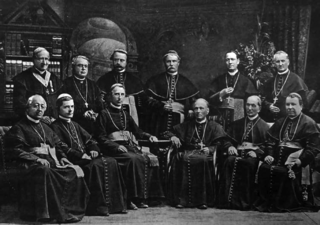
Clergy are formal leaders within established religions. Their roles and functions vary in different religious traditions, but usually involve presiding over specific rituals and teaching their religion's doctrines and practices. Some of the terms used for individual clergy are clergyman, clergywoman, clergyperson, churchman, cleric, ecclesiastic, and vicegerent while clerk in holy orders has a long history but is rarely used.
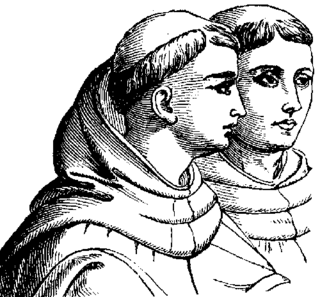
Tonsure is the practice of cutting or shaving some or all of the hair on the scalp as a sign of religious devotion or humility. The term originates from the Latin word tonsura and referred to a specific practice in medieval Catholicism, abandoned by papal order in 1972. Tonsure can also refer to the secular practice of shaving all or part of the scalp to show support or sympathy, or to designate mourning. Current usage more generally refers to cutting or shaving for monks, devotees, or mystics of any religion as a symbol of their renunciation of worldly fashion and esteem.

Joseph II was Holy Roman Emperor from 18 August 1765 and sole ruler of the Habsburg monarchy from 29 November 1780 until his death. He was the eldest son of Empress Maria Theresa and her husband, Emperor Francis I, and the brother of Marie Antoinette, Leopold II, Maria Carolina of Austria and Maria Amalia, Duchess of Parma. He was thus the first ruler in the Austrian dominions of the union of the Houses of Habsburg and Lorraine, styled Habsburg-Lorraine.

Joseph I was Holy Roman Emperor and ruler of the Austrian Habsburg monarchy from 1705 until his death in 1711. He was the eldest son of Leopold I, Holy Roman Emperor from his third wife, Eleonor Magdalene of Neuburg. Joseph was crowned King of Hungary at the age of nine in 1687 and was elected King of the Romans at the age of eleven in 1690. He succeeded to the thrones of Bohemia and the Holy Roman Empire when his father died.
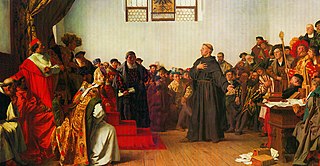
The Diet of Worms of 1521 was an imperial diet of the Holy Roman Empire called by Emperor Charles V and conducted in the Imperial Free City of Worms. Martin Luther was summoned to the diet in order to renounce or reaffirm his views in response to a Papal bull of Pope Leo X. In answer to questioning, he defended these views and refused to recant them. At the end of the diet, the Emperor issued the Edict of Worms, a decree which condemned Luther as "a notorious heretic" and banned citizens of the Empire from propagating his ideas. Although the Protestant Reformation is usually considered to have begun in 1517, the edict signals the first overt schism.
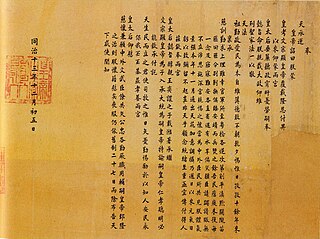
An edict is a decree or announcement of a law, often associated with monarchism, but it can be under any official authority. Synonyms include "dictum" and "pronouncement". Edict derives from the Latin edictum.

The Edict of Milan was the February 313 AD agreement to treat Christians benevolently within the Roman Empire. Western Roman Emperor Constantine I and Emperor Licinius, who controlled the Balkans, met in Mediolanum and, among other things, agreed to change policies towards Christians following the edict of toleration issued by Emperor Galerius two years earlier in Serdica. The Edict of Milan gave Christianity legal status and a reprieve from persecution but did not make it the state church of the Roman Empire, which occurred in AD 380 with the Edict of Thessalonica.

An edict of toleration is a declaration, made by a government or ruler, and states that members of a given religion will not suffer religious persecution for engaging in their traditions' practices. Edicts may imply tacit acceptance of a state religion.

The Diocletianic or Great Persecution was the last and most severe persecution of Christians in the Roman Empire. In 303, the emperors Diocletian, Maximian, Galerius, and Constantius issued a series of edicts rescinding Christians' legal rights and demanding that they comply with traditional religious practices. Later edicts targeted the clergy and demanded universal sacrifice, ordering all inhabitants to sacrifice to the gods. The persecution varied in intensity across the empire—weakest in Gaul and Britain, where only the first edict was applied, and strongest in the Eastern provinces. Persecutory laws were nullified by different emperors at different times, but Constantine and Licinius' Edict of Milan in 313 has traditionally marked the end of the persecution.

Josephinism is a name given collectively to the domestic policies of Joseph II, Holy Roman Emperor (1765–1790). During the ten years in which Joseph was the sole ruler of the Habsburg monarchy (1780–1790), he attempted to legislate a series of drastic reforms to remodel Austria in the form of what liberals saw as an ideal Enlightened state. This provoked severe resistance from powerful forces within and outside his empire, but ensured that he would be remembered as an "enlightened ruler" by historians from then to the present day.

The Order of Saint Basil the Great, also known as the Basilian Order of Saint Josaphat, is a Greek Catholic monastic order of pontifical right that works actively among Ukrainian Catholics and other Greek-Catholic churches in central and Eastern Europe. The order received approbation on August 20, 1631, and is based at the Monastery of the Holy Trinity, Vilnius.

Eastern Christian monasticism is the life followed by monks and nuns of the Eastern Orthodox Church, Oriental Orthodoxy, the Church of the East and some Eastern Catholic Churches.
The history of the Catholic Church is the formation, events, and historical development of the Catholic Church through time.
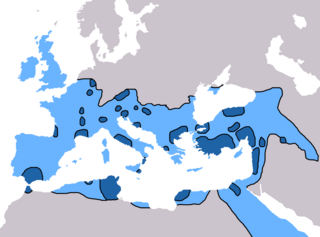
Christianity in the 4th century was dominated in its early stage by Constantine the Great and the First Council of Nicaea of 325, which was the beginning of the period of the First seven Ecumenical Councils (325–787), and in its late stage by the Edict of Thessalonica of 380, which made Nicene Christianity the state church of the Roman Empire.
The Edict of Thessalonica, issued on 27 February AD 380 by Theodosius I, made Nicene Christianity the state church of the Roman Empire. It condemned other Christian creeds such as Arianism as heresies of "foolish madmen," and authorized their punishment.
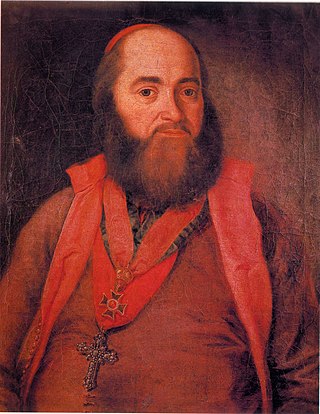
Mojsije Putnik (1728–1790) was the Metropolitan of Sremski Karlovci between 1781 and 1790, during the reign of Joseph II. He was known for publishing the Toleranzpatent meant to ensure equal rights for the Serbian Orthodox Church and the Catholic church in Sremski Karlovci.
The suppression of monasteries refers to various events at different times and places when monastic foundations were abolished and their possessions were appropriated by the state.
References
- ↑ By Frank Tallett and Nicholas Atkin, Priests, Prelates and People: A History of European Catholicism Since 1750 (London and New York: I. B. Tauris, 2004), 12.